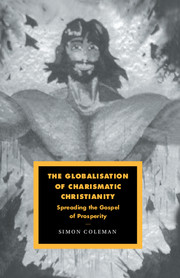Book contents
- Frontmatter
- Contents
- List of illustrations
- Acknowledgements
- Introduction
- Chapter One A ‘weird babel of tongues’: charisma in the modern world
- Chapter Two ‘Faith which conquers the world’: globalisation and charisma
- Chapter Three Sweden: national ‘state’ and global ‘site’
- Chapter Four The Word of Life: organising global culture
- Chapter Five Words: from narrative to embodiment
- Chapter Six Aesthetics: from iconography to architecture
- Chapter Seven Broadcasting the faith
- Chapter Eight Expansive agency
- Chapter Nine Contesting the nation
- Chapter Ten The Word and the world
- References
- Index
Chapter Two - ‘Faith which conquers the world’: globalisation and charisma
Published online by Cambridge University Press: 22 September 2009
- Frontmatter
- Contents
- List of illustrations
- Acknowledgements
- Introduction
- Chapter One A ‘weird babel of tongues’: charisma in the modern world
- Chapter Two ‘Faith which conquers the world’: globalisation and charisma
- Chapter Three Sweden: national ‘state’ and global ‘site’
- Chapter Four The Word of Life: organising global culture
- Chapter Five Words: from narrative to embodiment
- Chapter Six Aesthetics: from iconography to architecture
- Chapter Seven Broadcasting the faith
- Chapter Eight Expansive agency
- Chapter Nine Contesting the nation
- Chapter Ten The Word and the world
- References
- Index
Summary
Charismatic Christianity is flourishing in the contemporary world. It is a fluid culture that is seeping into numerous social contexts and even permeating supposedly secular practices such as economic consumption and the deployment of technology. Charismatics often view such developments in both defensive and triumphalist terms: they regard themselves as reclaiming territory lost to the devil at the same time as they are spreading the Good News of the Gospels to all nations. The phrase ‘Faith which conquers the world’ is a quotation from the Bible (1 John 5:4–5); it is also the title of a book by Ulf Ekman, founder and head pastor of the group we shall be focussing on in later chapters, the Swedish ‘Word of Life’ Ministry. Ekman is referring here to ‘the world’ as constituting not only the fallen domain of secular humanity, but also the collection of all societies and cultures – including many believers who are already ‘born-again’ – towards which charismatics should direct their enthusiastic gaze. My aim in this chapter is to juxtapose charismatic understandings of their calling with social scientific analyses of broader developments that are also occurring on a world-wide scale. In other words, I shall begin the task of exploring some of the affinities and connections between charismatic culture and globalisation.
Globalisation became a highly fashionable concept during the 1990s.
- Type
- Chapter
- Information
- The Globalisation of Charismatic Christianity , pp. 49 - 71Publisher: Cambridge University PressPrint publication year: 2000



